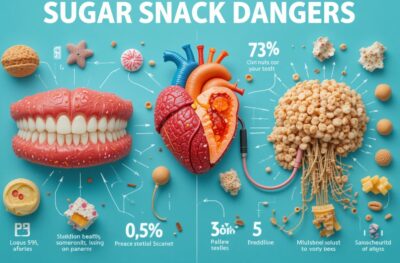What is the relation between depression and mind and body?
In our fast‐paced lives, we constantly face challenges that test our inner resilience. Mind Body Connection becomes crucial when we experience deep negative emotions, such as fear or anxiety. How do these feelings influence our oxygen flow and impact vital organs like the lungs, heart, digestive system, and most importantly, the brain? This article explores a step-by-step journey through the body’s response to negative emotions, using clear examples, practical steps, and engaging questions to guide you.
Table of contents
1. What is the Vagus Nerve and Its Function?
The vagus nerve plays a central role in the Mind Body Connection. It is one of the longest nerves in the body, stretching from the brainstem to various organs. Therefore, it directly influences our emotional state and physical health.
- Role in Regulation:
- It regulates heart rate and blood pressure.
- It facilitates digestive processes by transmitting signals to the gastrointestinal tract.
- It helps manage the breathing cycle in the lungs.
- Practical Implication:
- When negative emotions intensify, the vagus nerve can signal the body to enter a state of stress, which alters the normal oxygen flow to these organs.
- For example, during a moment of intense anxiety, you might notice a rapid heartbeat or shortness of breath, symptoms that reflect this nerve’s activation.
This direct link emphasizes the importance of a balanced Mind Body Connection in maintaining overall well-being.
2. How Do Negative Emotions Impact the Body?
Negative emotions, including depression, fear, and stress, trigger a cascade of physiological changes. Consequently, this cascade disrupts the Mind Body Connection and compromises the efficient circulation of oxygen.
- Triggering Stress Response:
- Fear or anxiety signals the brain to activate the “fight or flight” response.
- This response increases adrenaline production, which temporarily alters oxygen distribution.
- Impact on Organs:
- The heart accelerates its rhythm, which may lead to palpitations.
- The lungs may experience shallow breathing, reducing oxygen intake.
- The digestive system slows down, impairing nutrient absorption.
- The brain receives less oxygen, affecting cognitive function.
By understanding these steps, you can appreciate why maintaining a calm state is vital for a robust Mind Body Connection. Therefore, recognizing the signs of negative emotions early can empower you to take corrective measures.
3. How Does the Mind Body Connection Affect Organ Function?
The dynamic interplay between emotions and physiology is evident in the Mind Body Connection. Negative emotions affect the oxygenation of tissues in several ways:
- Direct Effects on the Brain:
- A lack of oxygen in the brain can lead to impaired concentration and memory.
- Sustained negative feelings may result in long-term changes in brain function.
- Cardiovascular Response:
- The heart works harder under stress, which might eventually cause cardiovascular issues.
- Continuous activation can lead to high blood pressure and arrhythmia.
- Respiratory Changes:
- The lungs might struggle to maintain optimal oxygen levels.
- Over time, inefficient breathing can compromise overall respiratory health.
- Digestive Disruptions:
- The digestive system becomes less effective, leading to issues like indigestion and irregular bowel movements.
Each of these effects reinforces the idea that a strong Mind Body Connection is essential for ensuring that all organs receive the oxygen they need to function properly.
4. What Are the Steps of Negative Emotion Impact on the Body?
Let’s explore the process step-by-step, ensuring clarity and practical understanding:
- Initial Emotional Trigger:
- Fear, anxiety, or depression strikes.
- The brain perceives a threat and activates the stress response.
- Vagus Nerve Activation:
- The vagus nerve sends signals that alter bodily functions.
- Oxygen is diverted from non-essential functions to prepare for immediate action.
- Alteration in Organ Function:
- The heart beats faster, the lungs adopt a shallow breathing pattern, and the digestive system slows.
- This process ensures the body is ready for action, albeit at the expense of long-term health.
- Sustained Stress and Organ Damage:
- Prolonged exposure to negative emotions maintains a heightened stress state.
- Oxygen flow becomes continuously compromised, affecting the brain, heart, lungs, and digestive system.
- Cycle of Negative Impact:
- The continued lack of oxygen exacerbates negative emotions, further disrupting the Mind Body Connection.
- Breaking this cycle requires conscious intervention and stress management.
Below is a simplified table summarizing these steps:
| Step | Physiological Response | Impact on Mind Body Connection |
|---|---|---|
| 1. Emotional Trigger | Brain initiates stress response | Initial disruption begins |
| 2. Vagus Nerve Activation | Alters heart rate, breathing, and digestion | Oxygen flow is reallocated |
| 3. Organ Function Alteration | Increased heart rate, shallow breathing, slowed digestion | Direct impact on organ efficiency |
| 4. Sustained Stress | Prolonged altered state leads to organ strain | Continuous disruption of the Mind Body Connection |
| 5. Cycle Reinforcement | Ongoing stress further impairs oxygen delivery | Feedback loop aggravates overall health |
This step-by-step breakdown shows how negative emotions can lead to a vicious cycle that undermines the Mind Body Connection.
5. How Can We Improve Our Mind Body Connection?
To restore a balanced Mind Body Connection, you need practical steps that work on both emotional and physical levels:
- Adopt Stress-Reduction Techniques:
- Practice mindfulness and deep breathing exercises to calm the vagus nerve.
- Engage in regular physical activity to promote better oxygen circulation.
- Build Emotional Resilience:
- Journaling your thoughts can help identify triggers.
- Social support from family and friends offers emotional relief.
- Healthy Lifestyle Choices:
- Ensure a balanced diet rich in antioxidants to support brain health.
- Prioritize sufficient sleep to allow your body to recover.
- Professional Guidance:
- Consider speaking with a therapist if negative emotions persist.
- Regular health check-ups can monitor the impact on the heart, lungs, and digestive system.

Implementing these strategies not only improves the flow of oxygen to your vital organs but also strengthens the Mind Body Connection, enabling a healthier life.
In conclusion, recognizing the profound impact of negative emotions on our body systems and understanding the role of the vagus nerve enables us to take proactive measures. Does the current state of your Mind Body Connection support your physical and emotional well-being? By embracing stress-reduction techniques, making healthier lifestyle choices, and actively managing your emotions, you can pave the way for improved oxygenation and overall health. The Mind Body Connection is not just a theoretical concept—it is a tangible pathway to a vibrant, balanced life.
By applying the strategies discussed above, you empower yourself to counter the cycle of negative emotion and reclaim control over your health. How will you enhance your Mind Body Connection today?
Direct Article Source Links with Details:
- Direct Link: https://pubmed.ncbi.nlm.nih.gov/23024503/
- Harvard Health Publishing – What is the Vagus Nerve?
- Date: May 10, 2020
- Author: Harvard Health Staff
- Direct Link: https://www.health.harvard.edu/heart-health/what-is-the-vagus-nerve
- Mayo Clinic – Stress: How It Affects Your Body
- Date: August 15, 2021
- Author: Mayo Clinic Staff
- Direct Link: https://www.mayoclinic.org/healthy-lifestyle/stress-management/in-depth/stress/art-20046037
- PubMed – Neurovisceral Integration in Emotion Regulation
- Date: 2009
- Authors: Thayer, J. F. et al.
- Direct Link: https://pubmed.ncbi.nlm.nih.gov/21980315/
- PubMed – Impact of Depression on Cardiovascular Health: A Review
- Date: 2012
- Authors: Carney, R. M. & Freedland, K. E.






